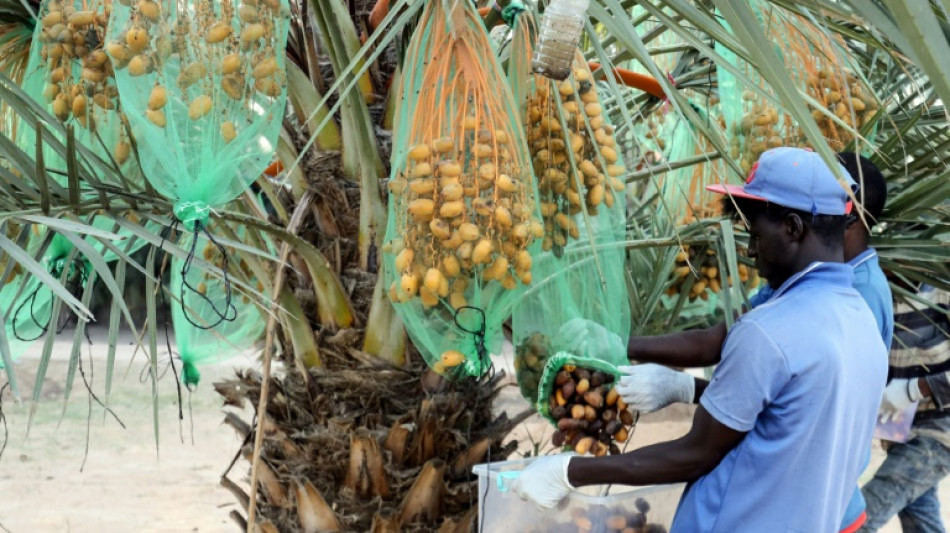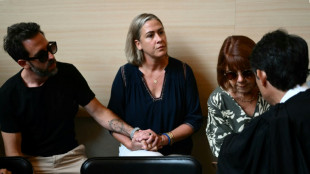
-
 Bad weather strikes again as third Australia-India Test ends in draw
Bad weather strikes again as third Australia-India Test ends in draw
-
US Fed expected to cut again, despite uncertain path ahead

-
 Storms halt Australia's unlikely tilt at victory over India
Storms halt Australia's unlikely tilt at victory over India
-
T20 series goes to Bangladesh with 27-run win over WIndies

-
 Giannis stars as Bucks beat Thunder to win NBA Cup
Giannis stars as Bucks beat Thunder to win NBA Cup
-
Federer hails 'true legend' as Australia says farewell to Fraser

-
 Shares in Japan chipmaker Kioxia rally on Tokyo debut
Shares in Japan chipmaker Kioxia rally on Tokyo debut
-
McIlroy and Scheffler rout Koepka and DeChambeau in PGA-LIV duel

-
 Zelensky huddles with European leaders as Trump looms
Zelensky huddles with European leaders as Trump looms
-
Japan 'regrets' release of anti-whaling activist Watson

-
 'End of the world': tsunami body collector's torment 20 years on
'End of the world': tsunami body collector's torment 20 years on
-
True blue tradition: how Japan's coveted jeans are made

-
 Macau's civil society 'falls silent' after 25 years of Chinese rule
Macau's civil society 'falls silent' after 25 years of Chinese rule
-
Indian Ocean nations to mark 20 years since devastating tsunami

-
 Asian markets diverge ahead of Fed news, Nissan soars on merger reports
Asian markets diverge ahead of Fed news, Nissan soars on merger reports
-
Hungarian Lego artist wows with his very grand designs

-
 Filipina on Indonesia death row arrives home to 'new life'
Filipina on Indonesia death row arrives home to 'new life'
-
No quitting: Bollywood's Aamir Khan wants to keep acting

-
 Australia-India 3rd Test heads for draw as more rain falls
Australia-India 3rd Test heads for draw as more rain falls
-
Famed Australian broadcaster denies 'baseless' sex offence charges

-
 Ex-Taiwan leader says China visit to foster cross-strait peace
Ex-Taiwan leader says China visit to foster cross-strait peace
-
Rescuers hunt for survivors in Vanuatu quake, 14 dead

-
 Cuba's 'invisible' tragedy: US-bound migrants who disappear in the Caribbean
Cuba's 'invisible' tragedy: US-bound migrants who disappear in the Caribbean
-
Morocco's women rug weavers battle to save age-old craft

-
 A 'destroyed' family still seeks answers after French mass rape trial
A 'destroyed' family still seeks answers after French mass rape trial
-
Sudan's doctors bear brunt of war as healthcare falls apart

-
 'Everybody wants to be my friend': Trump feels the love
'Everybody wants to be my friend': Trump feels the love
-
One billion users, but controversies mount up for TikTok

-
 Japan's Honda and Nissan in preliminary merger talks: reports
Japan's Honda and Nissan in preliminary merger talks: reports
-
NASA again delays return of astronauts stranded on space station

-
 Santner named New Zealand white ball captain
Santner named New Zealand white ball captain
-
Jets' He becomes first Chinese-born player to sign NHL deal

-
 PGA drops Vegas from next year's autumn schedule
PGA drops Vegas from next year's autumn schedule
-
Manchester United striker Rashford 'ready for new challenge'

-
 Chelsea, Lyon top Women's Champions League groups with perfect records
Chelsea, Lyon top Women's Champions League groups with perfect records
-
For real life? 'Bluey' coming to the big screen

-
 NBA All-Star Game to have mini-tournament format in 2025
NBA All-Star Game to have mini-tournament format in 2025
-
Syrian conflict 'has not ended': UN

-
 US CEO slaying suspect charged with murder as 'act of terrorism'
US CEO slaying suspect charged with murder as 'act of terrorism'
-
Canada's Trudeau battles to hold on after deputy PM resigns

-
 France imposes curfew for cyclone-hit Mayotte as toll rises
France imposes curfew for cyclone-hit Mayotte as toll rises
-
AI startup Databricks raises $10 bn as value soars

-
 Saim Ayub, Salman Agha steer Pakistan to victory in first ODI
Saim Ayub, Salman Agha steer Pakistan to victory in first ODI
-
Assad's fall clears way for expanded US strikes on IS jihadists

-
 Major quake crushes buildings in Vanuatu capital, 14 feared dead
Major quake crushes buildings in Vanuatu capital, 14 feared dead
-
No 'credible civilian' purpose for Iran uranium: UK, France, Germany

-
 Chelsea top Women's Champions League group with win in Madrid
Chelsea top Women's Champions League group with win in Madrid
-
Russia's chemical weapons chief killed in Moscow blast

-
 Japan's Honda and Nissan to begin merger talks: report
Japan's Honda and Nissan to begin merger talks: report
-
'Game of nerves': Georgians vow to outlast govt in pro-EU protests


Libya farmer breaks new ground with outlier date variety
In the Libyan countryside, farmer Ismail Ben Saoud has launched an agricultural experiment, banking on Mejhoul dates -- a premium variety cherished across the Arab world but untested in such a humid coastal climate.
Ben Saoud's five-hectare (12-acre) farm in Misrata, western Libya, stands out in the landscape that is dotted by olive and citrus trees.
Eight years after taking the leap, he says his 700 palm trees now produce high-quality Mejhoul dates which he hopes will reach international markets soon.
"People have claimed that these palms couldn't survive here, especially near the sea," said Ben Saoud, 42.
"But with persistence and careful experimentation, we are proving them wrong."
Mejhoul dates, native to Morocco's semi-arid regions, are famed for their large size, tender texture and rich sweetness.
Traditionally thought unsuitable for Mediterranean climates, the variety has exceeded Ben Saoud's expectations.
Using organic fertilisers and refining techniques over time, Ben Saoud now anticipates reaching full production capacity in just two years.
"The harvest has been very satisfactory," he said about this year's output.
"Another year or two and it will be optimal. We improve from year to year."
For Libyans and others across the Arab world, dates are a treasured food.
A staple sweet during festivities, they hold cultural as well as religious value, traditionally eaten to break the daily fast during the Muslim month of Ramadan.
Mejhoul dates go for up to 80 Libyan dinars (around $16) per kilogramme in local markets, far more than the price tag attached to other varieties, as low as six and up to 20 dinar.
But for many customers, Mejhoul prices match their quality, with an unwavering demand among Libyans preferring locally produced goods.
- 'Growing interest' -
The country has faced a host of woes since a 2011 NATO-backed uprising overthrew and killed longtime dictator Moamer Kadhafi, plunging Libya into instability and conflict.
Even before that, decades of near-exclusive reliance on oil revenue left many of Libya's sectors underdeveloped.
But many have been striving to bring around Libyan agriculture.
In Misrata, a major port city and commercial hub about 200 kilometres (120 miles) from the capital Tripoli, supermarkets are stocked with a variety of date products.
They run the gamut from molasses and pastes used in traditional pastries like makroudhs, to novel concoctions such as stuffed dates smothered in chocolate.
"The quality of Libyan dates has improved noticeably since the 2011 war," said Najwa, an Egyptian nurse on vacation, shopping for her favourite varieties.
"There's more care put into growing and preparing them now."
Salah Shagan, a Libyan agriculture expert, said that "more Libyans are turning to farming in recent years", with a "growing interest" in olives, vegetables and dates.
"These efforts not only bring income, but also revive our connection to the land."
Libya now has over 10 million date palms, producing more than 50,000 tonnes of fruit annually, according to the agriculture ministry.
Much of this production satisfies local demand, but farmers also aim to make it to international markets.
For Ben Saoud, exporting Mejhoul is his next major bet.
"Our local demand is already strong, so we must ensure we can meet that before expanding further," he said, walking through his orchard with his two young daughters, their mouths full of fresh dates.
K.Brown--BTB



